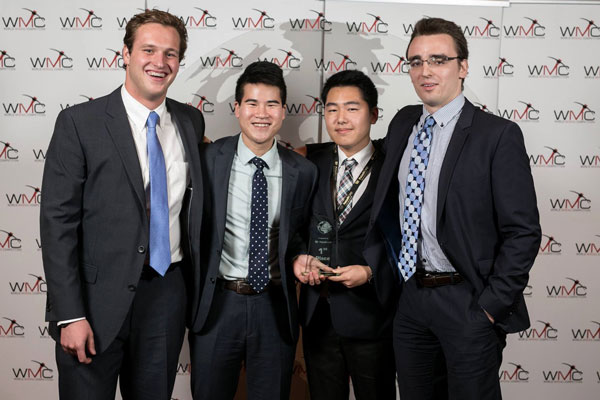
This story originally appeared on U of T Engineering News
The Lassonde Mineral Engineering Program team triumphed at the fourth annual World Mining Competition, held from Oct. 29 to Nov. 1, 2015 at the University of Saskatchewan in Saskatoon. Students Seung Young Baek (Year 4 MinE), Matthew Hart (Year 3 MinE), Daryl Li (Year 4 MinE), and Peter Miszkiel (Year 4 MinE) placed first among 13 teams and 11 schools from Canada, Germany, India and the United Kingdom.
The World Mining Competition challenges teams — usually composed of business, engineering and geology students — to solve a mining strategy case centring on issues facing the international mining industry. Established in 2012, the World Mining Competition is Canada’s first undergraduate mining case competition, held each year at the University of Saskatchewan. Previously called the National Mining Competition, the name change reflects the global representation of its participants.
“Our win really showcases that U of T is a top mineral engineering school and a force to be reckoned with,” said Miszkiel. “The fact that we came to an interdisciplinary case competition with only mineral engineering students demonstrates how diversified and well-rounded our knowledge and skill sets are.”
The team attributes their success to the quality education of the Lassonde Mineral Engineering Program and effective teamwork.
“Our classes, work experience, up-to-date knowledge of industry trends and understanding of the case gave us the tools we needed to compete with some of the brightest minds in Canada and internationally,” said Hart. “We came together so well because we are all strong in different areas: finance, risk management, corporate social responsibility and technical issues.”
This year’s case focused on sustainability. Teams acted as consultants for a fictitious major mining company looking to acquire a junior exploration company with a lithium mine. Students had 36 hours to create a 25-minute presentation on a holistic proposal that considered social, environmental, economic and political factors. Teams faced two rounds of judges from accounting, human resources and government representatives, as well as mining executives.
“We learned that what really makes or breaks mining projects is the ability to gain social licence,” said Li. “Ultimately, the country’s government and people allow a company to operate in it, so it’s vital to engage them, hear their concerns and take their opinions seriously. With is in mind, our responses were much stronger than the other teams’.”
The students hope to bring this momentum to their next competition, the Canadian Mining Games, which will take place in February 2016. All four students are also on the U of T Mining Games team.
“We want to continue to participate and outperform in mining competitions and represent the Lassonde Mineral Engineering Program,” said Baek.
[slideshow_deploy id=’5521′]